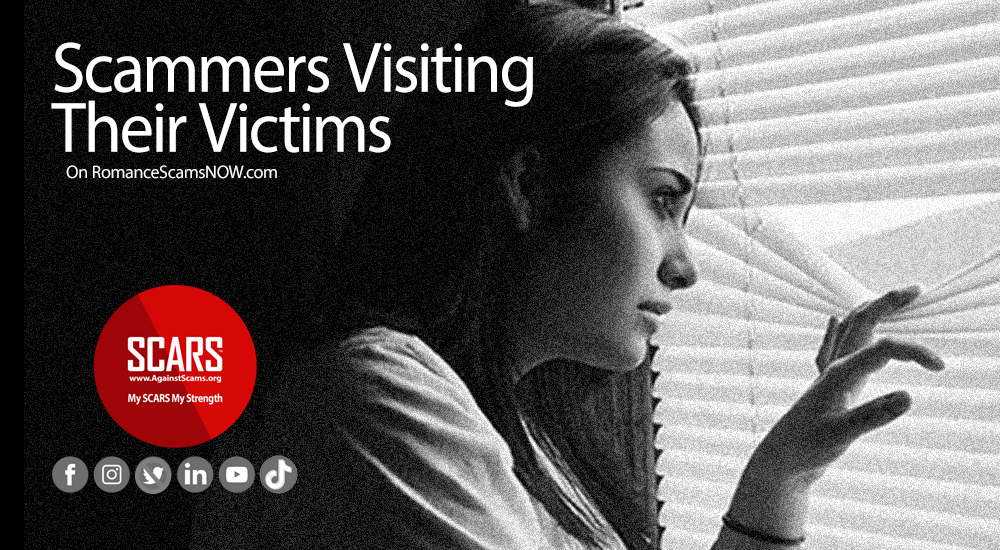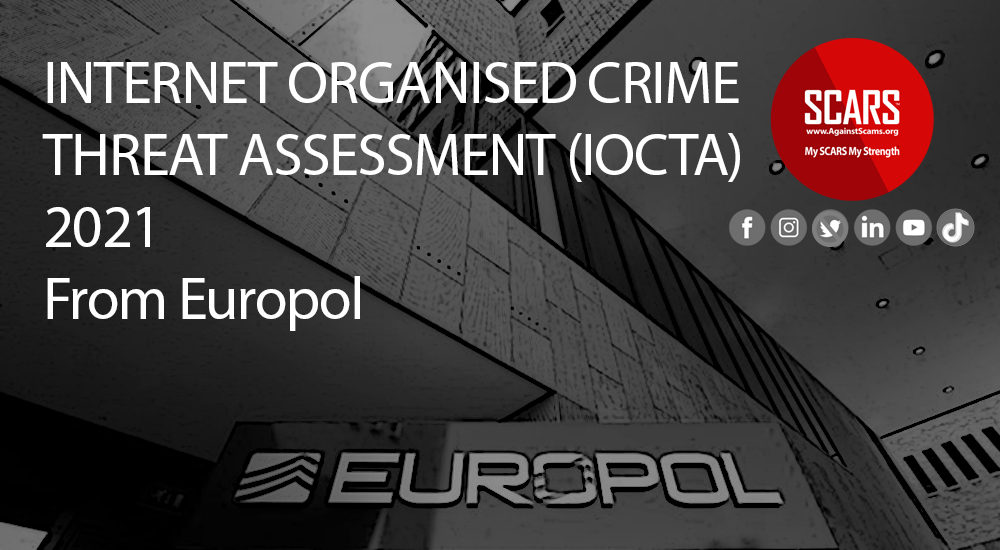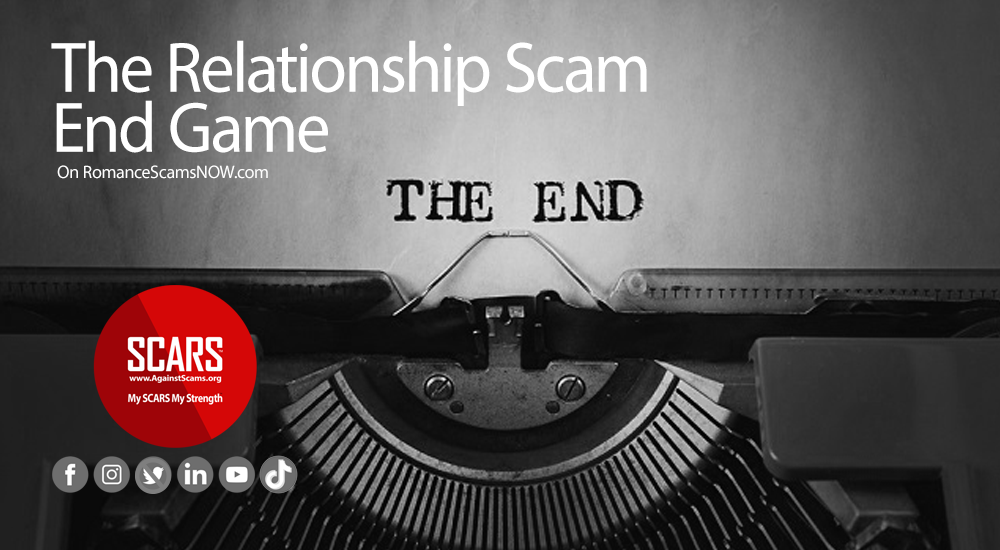
SCARS Institute’s Encyclopedia of Scams™ Published Continuously for 25 Years

The Confession Scam Technique – Final Reveal & “I Love You”
A Significant Percentage of Scam Victims report that just before the end of their scams, the scammer revealed their real face and said that they can grow to love the victim!
Of course, the confession scam technique is just another lie, but an effective one!
After spending weeks or months in a fake relationship with the scammer, a scam can go sideways – meaning that the victim finally discovers that it was all just a scam. But in the final moments, the scammer has an opportunity to regain control by confessing!
The Confession Scam is just another Typical Tactic
The typical tactic is for the scammer to admit that it was all a scam but that he/she really does love the victim – they grew to love the victim after all of the time they were together! This is very compelling for the victim, after all, they always wanted to believe in the fantasy and this is an opportunity to salvage it. So what if the face is not the real face, so what if the scammer has taken all the victim’s money, so what if the scammer has spent weeks or months lying to the victim. He/she loves the victim! This is the victim’s greatest desire come true.
We know that so many victims have such a hard time letting go. That human desire to be loved and accepted remains strong right up to the very end of the scam. Then at the last minute, the scammer confesses and says they really love the victim – this is a scene right out of a Hollywood movie! Right?
It Is Just Another Lie!
It is just another lie in the long line of stories and lies that the scammers tell their victims.
This is yet another attempt to perform an Amygdala Hijack and confuse the victims enough through a flood of neural transmitters & hormones and base desires to continue with the scam relationship. This is how romance scam manipulation works – a constant stream of manipulation to maintain control over the victim and to get them to send every last penny!
Scammers have scripts and procedures they follow when conducting scams. This increases the likelihood of success and saves the scammers a lot of time. After all, scamming is a very time-consuming business for the fraudsters involved. But there are also different stages in a scam, and many times they will bring in specialists from their team to take over during these phases:
- Initial contact and Grooming
- Manipulation and Control
- Getting the Money – the Closer
- End Game
The Confession Scam happens in the End Game phase of the fraud.
More about the Confession Scam Technique
Online scammers often reveal themselves at the end of a scam in an attempt to keep a relationship going and harvest more money. However, it is important to remember that this is nothing more than another attempt at deception.
Here are some common ways that online scammers reveal themselves at the end of a scam:
- They ask for money. This is the most obvious way that a scammer will reveal themselves. Scammers will often ask for money in order to pay for unexpected expenses, to invest in a business opportunity, or to help out with a personal emergency.
- They make threats. Scammers may threaten to expose personal information, to harm a loved one, or to take legal action if their victim does not send them money.
- They play on emotions. Scammers may try to guilt-trip their victims into sending them money by appealing to their sense of love, compassion, or fear.
- They create a sense of urgency. Scammers may claim that their victim needs to send them money immediately or that they will miss out on a lucrative opportunity.
- They offer to help. Scammers may offer to help their victims with a problem, such as getting out of debt or finding a new job. However, they will often require their victim to pay them a fee in exchange for their help.
During the End Game
Once a victim is beginning to show doubt or even to admit that they suspect, the scammer will attempt to maintain control, but when it is obvious that they cannot hold on then it will shift into the End Game phase.
When the deception is discovered, scammers will react in several different ways, depending on their criminal experience and the size of their crew.
Here are the typical end-game strategies or reactions that come from romance scammers:
- Threats – this is the most common. Its goal is to embed fear in the victim and to keep them quiet after the scam. Scammers will threaten not only the victim but also their families with either physical violence or with exposure – exposing the victim to judgment and ridicule.
- Blackmail – this ties in with the threats. Many victims are told that if they do not pay then the threats will be carried out.
- Sextortion – during the course of the scam many scammers will obtain sensitive information, possibly intimate photos that they will save for use at the end of the scam. Suddenly the scammer reveals that it was a scam and that they have these photos, videos, etc. and they will publish them or send them to family and friends unless the victim continues to pay.
- Anger – many less experienced scammers just get angry when discovered and then block the victim. In a way, this is the best possible outcome. It makes it clear that it was a scam and helps to stop communication with the victim.
- Insistence – some scammers will go to the grave insisting that they are real and that the victim just does not understand. These are typically scammers in smaller groups that do not have the experience or specialization needed for End Game scams.
- The Reveal/Confession Scam – this is where the scammer reveals him or herself as an African, Asian, Indian, etc. (usually African). They show their real face (but maybe not) and confess that they love the victim.
- Comeback Scams – these are posts scam scams, meaning that after the scam is clearly over, the scammer or someone else will come back and try another tactic. These include scam investigation scams promising to find the scammer, money recovery scams promising to get the victim’s money back, or police scams when the victim will be contacted by fake police officers promising to arrest the scammer – all want money, but deliver nothing.
End Game: Threats
We have talked about this before. Scammers can be vicious with victims and threaten them in so many ways.
During the course of the scam, the victim typically tells the scammer all about their life – their family, their children (if any), their friends, their jobs, and so much more. The scammer will weave this into their threats of exposure or violence. Scammers have been known to threaten to kill the victim and their family. They have been known to threaten the employment of the victim with made-up stories just to get even.
These are usually to try to get the victim to make one last payment but can be when the victim refuses to pay anything more as well. Regardless of what the threat is, in almost every case the threats are meaningless and never carried out.
Why is that? Because fundamentally scammers are business people and their time is valuable to them. When a victim stops the scam, they need to focus their time and attention on the next victims that are working. Sometimes a scammer will come back after a few days or weeks to see if the victim has reconsidered, but they do not have time to waste.
Remember
Once you discover the scam follow our 3 Steps for New Scam Victims – including blocking all contact with the scammer and other strangers!
More:
- Why Scammers Don’t Give Up (scamsnow.com)
- Magical Thinking – How Biased & Delusional Thinking Enslaves Scam Victims (scamsnow.com)
- Scammers Visiting Their Victims – The Urban Legend & The Truth (romancescamsnow.com)
- Scammer Threats – Nothing To Fear But Fear Itself! [UPDATED] (romancescamsnow.com)
- Scammer Urban Legends: Chapter 5 – Scammer Threats & Blackmail [UPDATED] (romancescamsnow.com)
- Threats From Scammers – Scam Basics [UPDATED] (romancescamsnow.com)
- Threats And Your Local Risk (romancescamsnow.com)
- Sextortion / Blackmail / Extortion Scams – Article Catalog (romancescamsnow.com)
- Scammers Anger – Losing Their Temper – How Scammers Operate (romancescamsnow.com)
- The Amygdala Hijack! A SCARS™ Guide [Infographic][Updated] (romancescamsnow.com)
- A Temporoparietal Junction (RTPJ/LTPJ) Theory Of Relationship Scams (scamsnow.com)
-/ 30 /-
What do you think about this?
Please share your thoughts in a comment below!
LEAVE A COMMENT?
Thank you for your comment. You may receive an email to follow up. We never share your data with marketers.
Recent Comments
On Other Articles
- on Love Bombing And How Romance Scam Victims Are Forced To Feel: “I was love bombed to the point that I would do just about anything for the scammer(s). I was told…” Feb 11, 14:24
- on Dani Daniels (Kira Lee Orsag): Another Scammer’s Favorite: “You provide a valuable service! I wish more people knew about it!” Feb 10, 15:05
- on Danielle Delaunay/Danielle Genevieve – Stolen Identity/Stolen Photos – Impersonation Victim UPDATED 2024: “We highly recommend that you simply turn away form the scam and scammers, and focus on the development of a…” Feb 4, 19:47
- on The Art Of Deception: The Fundamental Principals Of Successful Deceptions – 2024: “I experienced many of the deceptive tactics that romance scammers use. I was told various stories of hardship and why…” Feb 4, 15:27
- on Danielle Delaunay/Danielle Genevieve – Stolen Identity/Stolen Photos – Impersonation Victim UPDATED 2024: “Yes, I’m in that exact situation also. “Danielle” has seriously scammed me for 3 years now. “She” (he) doesn’t know…” Feb 4, 14:58
- on An Essay on Justice and Money Recovery – 2026: “you are so right I accidentally clicked on online justice I signed an agreement for 12k upfront but cd only…” Feb 3, 08:16
- on The SCARS Institute Top 50 Celebrity Impersonation Scams – 2025: “Quora has had visits from scammers pretending to be Keanu Reeves and Paul McCartney in 2025 and 2026.” Jan 27, 17:45
- on Scam Victims Should Limit Their Exposure To Scam News & Scammer Photos: “I used to look at scammers photos all the time; however, I don’t feel the need to do it anymore.…” Jan 26, 23:19
- on After A Scam, No One Can Tell You How You Will React: “This article was very informative, my scams happened 5 years ago; however, l do remember several of those emotions and/or…” Jan 23, 17:17
- on Situational Awareness and How Trauma Makes Scam Victims Less Safe – 2024: “I need to be more observant and I am practicing situational awareness. I’m saving this article to remind me of…” Jan 21, 22:55
ARTICLE META
Important Information for New Scam Victims
- Please visit www.ScamVictimsSupport.org – a SCARS Website for New Scam Victims & Sextortion Victims
- Enroll in FREE SCARS Scam Survivor’s School now at www.SCARSeducation.org
- Please visit www.ScamPsychology.org – to more fully understand the psychological concepts involved in scams and scam victim recovery
If you are looking for local trauma counselors please visit counseling.AgainstScams.org or join SCARS for our counseling/therapy benefit: membership.AgainstScams.org
If you need to speak with someone now, you can dial 988 or find phone numbers for crisis hotlines all around the world here: www.opencounseling.com/suicide-hotlines
A Note About Labeling!
We often use the term ‘scam victim’ in our articles, but this is a convenience to help those searching for information in search engines like Google. It is just a convenience and has no deeper meaning. If you have come through such an experience, YOU are a Survivor! It was not your fault. You are not alone! Axios!
A Question of Trust
At the SCARS Institute, we invite you to do your own research on the topics we speak about and publish, Our team investigates the subject being discussed, especially when it comes to understanding the scam victims-survivors experience. You can do Google searches but in many cases, you will have to wade through scientific papers and studies. However, remember that biases and perspectives matter and influence the outcome. Regardless, we encourage you to explore these topics as thoroughly as you can for your own awareness.
Statement About Victim Blaming
SCARS Institute articles examine different aspects of the scam victim experience, as well as those who may have been secondary victims. This work focuses on understanding victimization through the science of victimology, including common psychological and behavioral responses. The purpose is to help victims and survivors understand why these crimes occurred, reduce shame and self-blame, strengthen recovery programs and victim opportunities, and lower the risk of future victimization.
At times, these discussions may sound uncomfortable, overwhelming, or may be mistaken for blame. They are not. Scam victims are never blamed. Our goal is to explain the mechanisms of deception and the human responses that scammers exploit, and the processes that occur after the scam ends, so victims can better understand what happened to them and why it felt convincing at the time, and what the path looks like going forward.
Articles that address the psychology, neurology, physiology, and other characteristics of scams and the victim experience recognize that all people share cognitive and emotional traits that can be manipulated under the right conditions. These characteristics are not flaws. They are normal human functions that criminals deliberately exploit. Victims typically have little awareness of these mechanisms while a scam is unfolding and a very limited ability to control them. Awareness often comes only after the harm has occurred.
By explaining these processes, these articles help victims make sense of their experiences, understand common post-scam reactions, and identify ways to protect themselves moving forward. This knowledge supports recovery by replacing confusion and self-blame with clarity, context, and self-compassion.
Additional educational material on these topics is available at ScamPsychology.org – ScamsNOW.com and other SCARS Institute websites.
Psychology Disclaimer:
All articles about psychology and the human brain on this website are for information & education only
The information provided in this article is intended for educational and self-help purposes only and should not be construed as a substitute for professional therapy or counseling.
While any self-help techniques outlined herein may be beneficial for scam victims seeking to recover from their experience and move towards recovery, it is important to consult with a qualified mental health professional before initiating any course of action. Each individual’s experience and needs are unique, and what works for one person may not be suitable for another.
Additionally, any approach may not be appropriate for individuals with certain pre-existing mental health conditions or trauma histories. It is advisable to seek guidance from a licensed therapist or counselor who can provide personalized support, guidance, and treatment tailored to your specific needs.
If you are experiencing significant distress or emotional difficulties related to a scam or other traumatic event, please consult your doctor or mental health provider for appropriate care and support.
Also read our SCARS Institute Statement about Professional Care for Scam Victims – click here to go to our ScamsNOW.com website.
















This is great information as a heads up to what’s to come, potentially. Just when you think you’ve escaped, you can be targeted again, and in completely different ways.
So many ways to retain a victim – if time is so important why don’t they just move on? If the victim is out of money….they are out of money. I guess there could be some victims that sell things, or get a loan or borrow from friends. I plain flat out told the criminal I had no more money, period! But they didn’t believe me.
There are so many angles to the scam that I didn’t realize. Looking back it seems “obvious” that it was a scam, but the grooming/manipulation was expert and it got me at a vulnerable time. The “end game” reveal was a necessary step for me to provide “closure” or a reality check on what happened. I call that my “brick wall moment!”